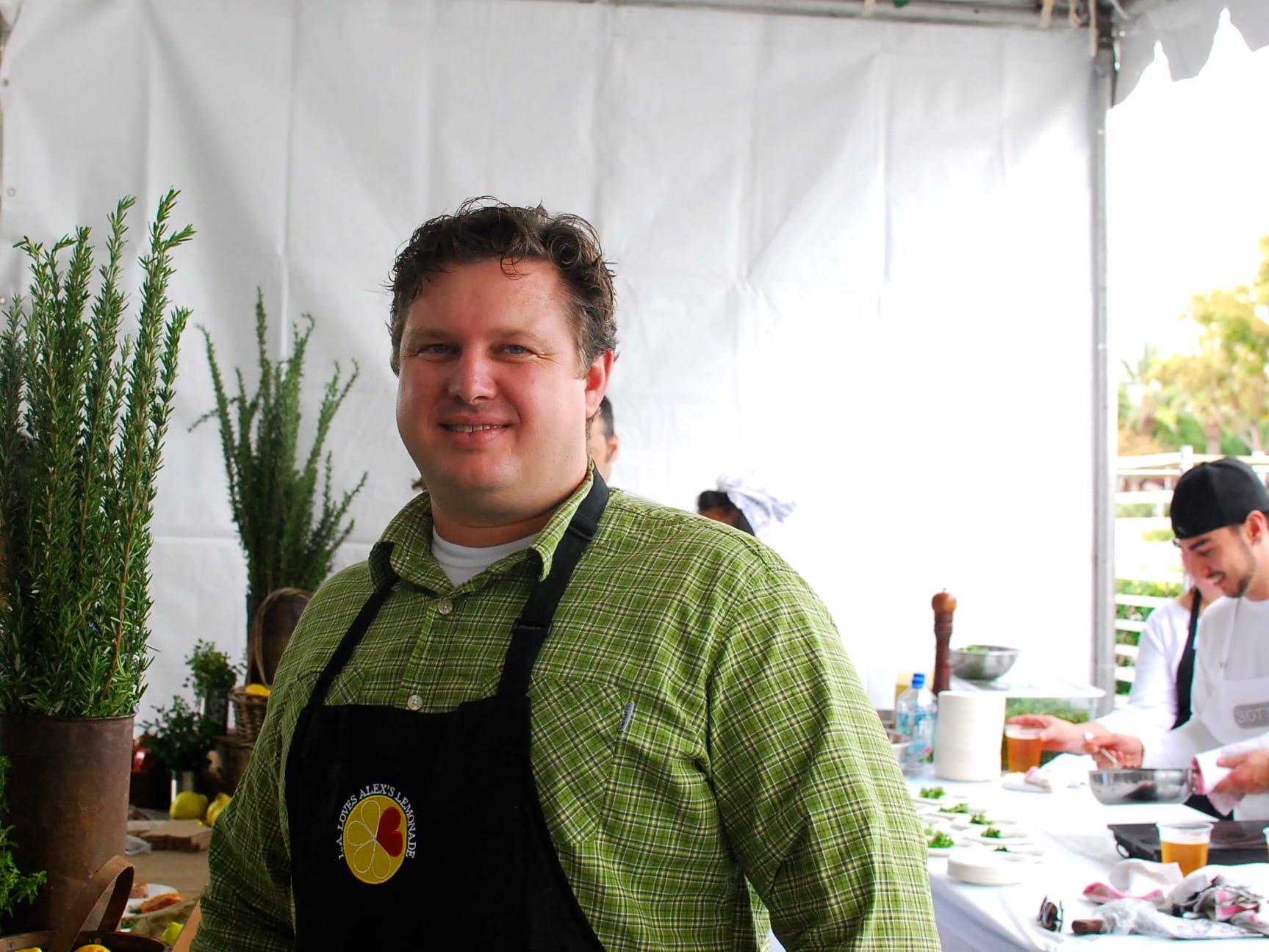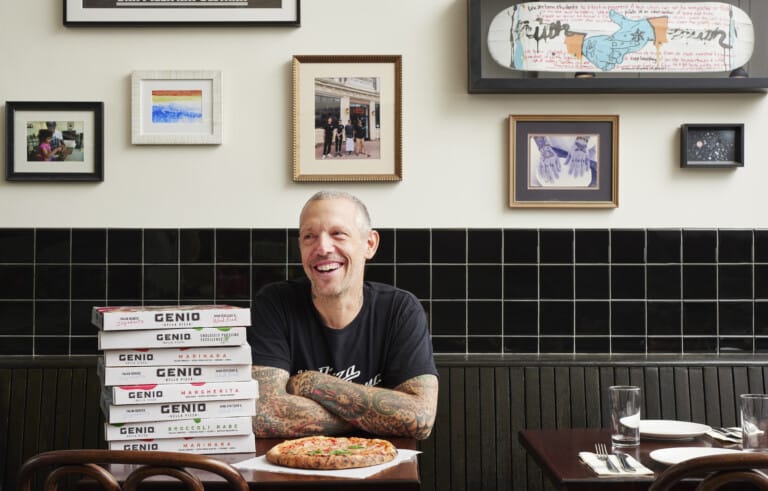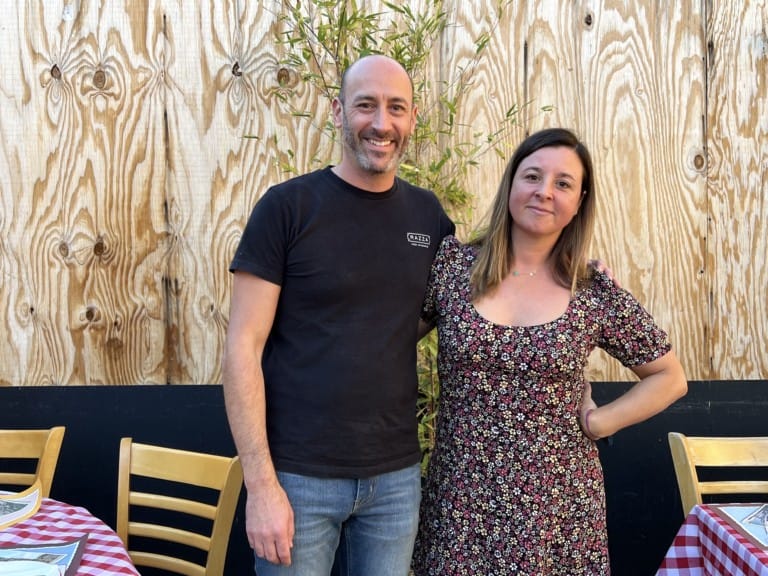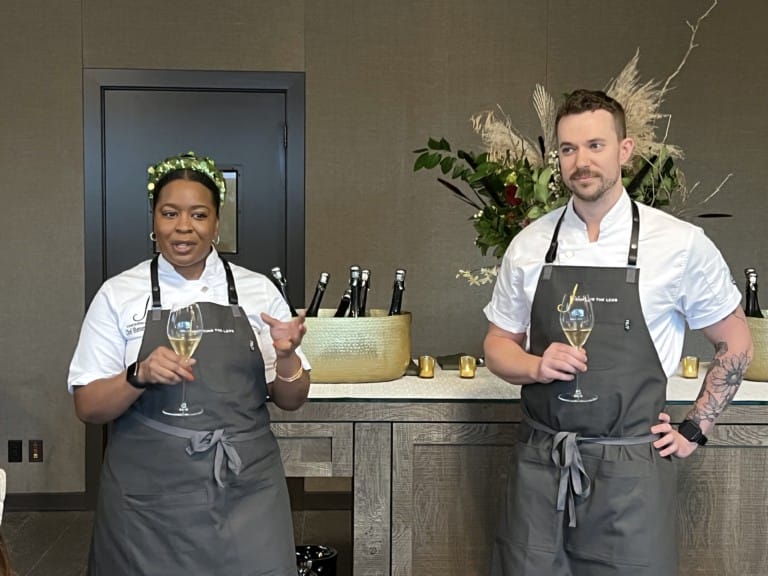I’m not exactly shy about my passion for pork, and neither is chef Stephen Stryjewski, who founded the first Cochon in 2007 in New Orleans. He and business partner Donald Link, his former boss at Herbsaint, added Cochon Butcher, an “artisanal meat shop and sWine bar,” in 2009 and just this September, they expanded Cochon to Lafayette. I met Chef Stryjewski at Alex’s Lemonade Stand, and he better explained his connection to restaurants, cooking, and of course, pork.
Joshua Lurie: What’s the criteria for a dish that goes on your menu?
Stephen Stryjewski: It just has to be delicious. It also has to stay in the Southern vernacular, which has always been an interesting battle. We’re doing pickled catfish today, which is really an escabeche, but escabeche doesn’t really fit in the Southern vernacular, so we just kind of renamed it. It’s cornmeal dusted catfish that’s deep fried, then pickled in vinegar with chiles and onions.
JL: What’s the biggest challenge about operating more than one restaurant?
SS: Proximity has really been the challenge with this one. We have the butcher shop, Cochon Butcher, which is adjacent to Cochon. That was a much different situation because it wasn’t two hours away. The travel is really what’s made this a different situation, personally, but the restaurant has been great. It’s a much more agrarian community, so the procurement of local product has been a lot easier. The relationships have come a lot faster, especially on things like rice and crawfish. Pork’s still an issue in Louisiana, but that’s more of a processing issue, because a lot of people grow good pigs, but there are not a lot of places to process ‘em.
JL: What would life be like for you without pork?
SS: [laughs] This is a loaded question, right now. I was just talking to someone else about how much I’ve been enjoying vegetables lately, ‘cause the summers in New Orleans suck for vegetables. We’re on the exact opposite end of the spectrum from the rest of the United States. We’re just coming into heavy vegetable season. I’ve been eating pork all summer long with reckless abandon. Now I’m all about some nice vegetables, roughage.
JL: Was there a moment where you knew you’d become a professional chef?
SS: It’s always something I kind of thought about. I worked in some crappy restaurants and at some point in time decided I wanted to be a cook, but I wanted to take a different route. I went to culinary school [CIA] because I didn’t really have any mentors or really know how to get hired at restaurants. It’s been great ever since then. It’s been a fun adventure.
JL: What was your very first night like working in a professional restaurant kitchen, and where was it?
SS: There have been several first nights, but all of them have been kind of nerve wracking, intimidating. Luckily my father was in the Army for 28 years, so I’m kind of used to that whole intimidating attitude. I was able to smile and let it roll off. Every one is interesting. Tra Vigne was really scary. Michael Chiarello and Carmen Quagliata were very intense people. That was probably the first one where I worked with a top chef.
JL: What do you look for when you’re hiring somebody to work in your kitchen?
SS: Attitude, really, if somebody is open, knowledge base and experience aren’t really as important as just the desire to learn and the desire to work hard.
JL: What was the last meal that you cooked at home?
SS: [laughs] That’s another tough one because we just opened in Lafayette and I’ve been spending all my time out there. I did Asian style beef short ribs with a little hoisin. It was very stereotypical Asian beef short ribs.
JL: What’s the key to a good version of that dish?
SS: You know what, put it in the pressure cooker. I like a nice sticky sauce, but I don’t like it cloyingly sweet. I like a nice balance, a good amount of fish sauce and soy sauce in there, just enough hoisin to make it have that tactile effect, but not like it’s super sticky sweet. That’s usually the problem I run into with those.
JL: Where and what do you like to drink when you’re not working?
SS: I like cheap beer and good bourbon.
JL: Does it matter what?
SS: I like Miller High Life and I guess it’s hipster chic, or whatever. All cooks seem to like that, cheap beer. And then my go to bourbon is Evan Williams single barrel. It’s my every day drinking bourbon. I’m always happy.
JL: Where do you go to drink it?
SS: Now, home.
JL: Is there a person you’ve never cooked with before that you’d most like to cook with?
SS: Probably any of the old-line French chefs, like Jacques Pepin or Paul Bocuse, someone like that who I’ve always idolized. Those would be interesting people.
JL: What is your top selling dish and why do you think that’s the case?
SS: Our cochon is our signature dish, and it’s definitely our top seller. Namesake and theme, it’s a whole big braised, formed into patties and pan-seared in some lard and served over braised cabbage and turnips and served with cracklins, pickled peaches. It’s delicious. It’s a little bit of everything that’s great about pork, all condensed down into one dish. That’s got to be why it’s our most popular.
JL: This might seem obvious, but if you could only cook with one more protein, would it be pork?
SS: Yeah it would. I mean, bacon solidifies any argument about what’s better than pork. Everything’s better with bacon.









Leave a Comment